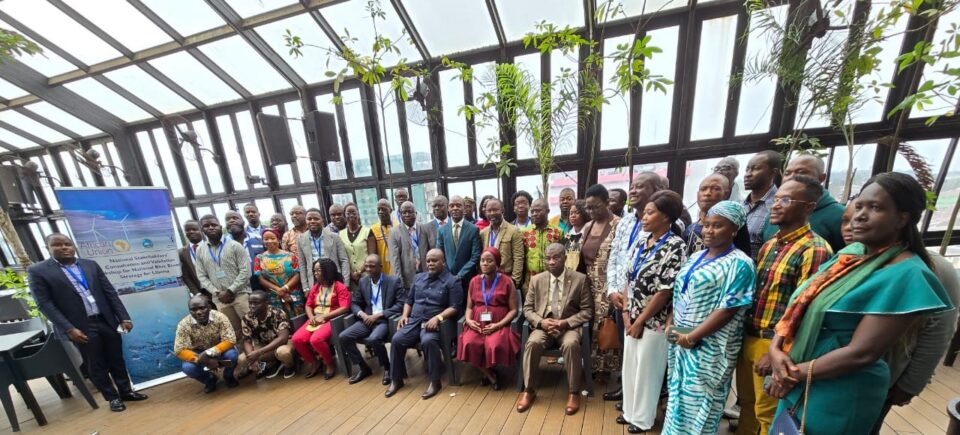By AU-IBAR Team, Fisheries Experts And Others
Monrovia, Liberia-Liberian Fisheries Experts, and others including those from the African Union Inter-African Bureau for Animal Resources (AU-IBAR) commenced work on the country’s Blue Economy strategy to define priority issues for development and identify key priorities for national development.
Experts at the workshop are from line Ministries and Agencies, including the National Fisheries and Aquaculture Authority, the Liberia Maritime Authority, the National Port Authority, the Ministry of Finance and Development Planning, the Environmental Protection Agency, the Ministries of Agriculture, Mines and Energy, and Academic institutions, among others, Tuesday, September 24, 2024, began working on the Blue Economy Strategy at the start of a three-day National Consultative workshop taking place in Monrovia. The workshop is organized by the African Union Inter-African Bureau for Animal Resources (AU-IBAR) and funded by the Kingdom of Norway and the government of Sweden through SIDA.
The African Union Inter-African Bureau for Animal Resources (AU-IBAR) intervention in the fisheries and aquaculture sector is guided by the Policy Framework and Reform Strategy for Fisheries and Aquaculture in Africa (PFRS) which is aimed at improving governance of the industry for increased sustainable contribution to food security, livelihoods, and wealth creation. Also, within the framework of the African Union Agenda 2063, the Africa Blue Economy Strategy envisioned an inclusive and sustainable blue economy that significantly contributes to Africa’s transformation and growth.
Moreover, during the first day of the workshop, the Director for Research and Statistics at the National Fisheries and Aquaculture Authority, Mr. Austin Saye Wehye, and the Director for Marine Fisheries and Environment Solomon Daryoue spoke on the roles their institution has played in Blue Economy.
Mr. Wehye disclosed that as the governing and regulatory arm of the aquatic resources, the Management of the Liberian Fisheries Authority, NaFAA is involved in licensing vessels, from small skills to industrial.
Director Wehye further mentioned that NaFAA’s role in the Blue Economy is to sustainably manage the natural resources or biodiversity within the ocean and inland waters. “NaFAA Management has put in place structures to adequately manage the fisheries sector”. He said the Monitoring, Control, and Surveillance Department of NaFAA is responsible for ensuring compliance in collaboration with other government line ministries and agencies including the Liberian Coast Guard, the Liberian Immigration Service, and the Liberia National Police to help ensure that the value of Liberia’s resources is obtained.
At the same time, the Director for Marine Fisheries and Environment Mr. Solomon Daryoue called for the Strengthening of NaFAAs capacity to conduct monitoring, control, and surveillance. Director Daryoue added that engaging communities and providing support to CMAs, and Cooperatives adds value to fisheries products to understand the true value of the sector.
Speaking earlier via Zoom, the Head of the Blue Economy Division Directorate of Sustainable Environment and Blue Economy (Darbe) African Union Commission Mr. George MBA Asseko stated that the workshop marks a crucial step towards defining the priorities and identifying strategic actions that will guide the formulation of a comprehensive Blue Economy strategy tailored to the specific needs and aspirations of the Republic of Liberia.
Mr. Asseko noted that by bringing together a diverse group of stakeholders’ government officials, private sector leaders, academic experts, and community representatives, AU-IBAR is ensuring that the strategy developed is not only robust and holistic but also inclusive and reflective of the voices of all who have a stake in the future of Liberia’s Blue Economy.
“This workshop marks a crucial step towards defining our priorities and identifying strategic actions that will guide the formulation of a comprehensive Blue Economy strategy tailored to the specific needs and aspirations of the Republic of Liberia. By bringing together a diverse group of stakeholders – government officials, private sector leaders, academic experts, and community representatives – we are ensuring that the strategy we develop is not only robust and holistic but also inclusive and reflective of the voices of all who have a stake in the future of Liberia’s Blue Economy”.
He said the strategy aligns with the African Union’s Agenda 2063 and the Africa Blue Economy Strategy, which emphasizes the sustainable utilization of Africa’s aquatic resources to achieve socio-economic transformation. For Liberia, the validation of this strategy is not just a formal endorsement; it is a crucial step toward realizing a vision of economic resilience, environmental stewardship, and social equity.
Meanwhile, declaring the workshop open, the Deputy Commissioner for Vessel Registration at the Liberia Maritime Authority John F. Harvey who proxied for the Commissioner General Neto Zarzar Lighe, said Liberia stands at a critical juncture in its development trajectory, with the opportunity to harness the potential of its ocean resources to drive sustainable economic growth and improve the well-being of its people.
Hon. Harvey mentioned that “by developing a National Blue Economy Strategy, Liberia can chart a course toward a more prosperous, resilient, and sustainable future for generations to come’.
However, Hon Harvey said the blue economy presents a unique opportunity for Liberia to tap into its maritime resources, including fisheries, marine tourism, shipping, and renewable energy, to create jobs, boost economic growth, and improve livelihoods, particularly in coastal communities.

